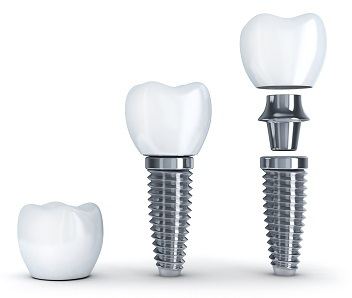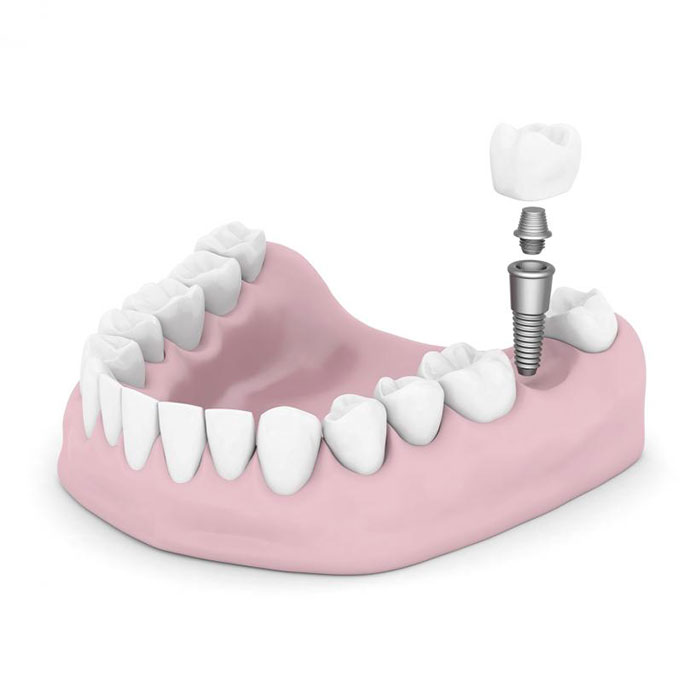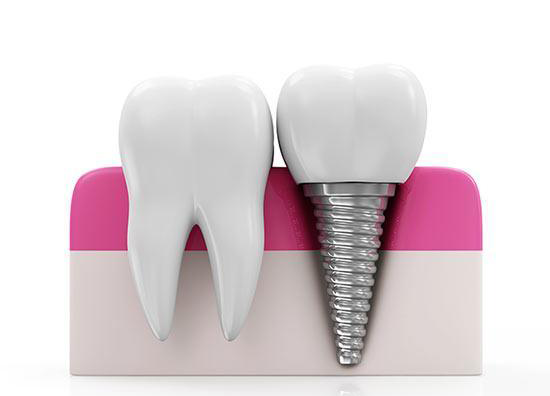Dental Implants
If you have lost teeth to injury, gum disease or decay, dental implants may provide you with a second chance to make a positive first impression at work, at school and at play. We offer dental implants that provide outstanding support for bridges, crowns and other prosthetic replacements that look and work like your natural teeth. This guide to dental implants will provide you with the information you need to make the right choice for your appearance and your dental health.

What is a Dental Implant?
Dental implants are available in endosteal and subperiosteal varieties, each of which is intended to provide you with a more complete smile. The difference between these two types of dental implants lies in the way in which they are attached:
- Endosteal dental implants are fitted into the jawbone to provide the greatest possible strength for the attachment.
- Subperiosteal dental implants are alternatives designed for people with significant bone loss. These advanced dental implants are positioned precisely within the gums to provide support for crowns and bridges.
Dental implants provide the internal support needed for replacement teeth and crowns. This can ensure the most secure and durable results for these cosmetic dentistry solutions.

How Much Do Dental Implants Cost?
For patients worried about dental implants cost, the best way to find out about pricing and options for these procedures is to schedule an appointment with our dental implants experts. We can provide you with an accurate evaluation of the current state of your teeth, gums and the bones of your jaw. This can provide you with a better estimate of your dental implants cost and can help you plan for these expenses more effectively. We offer affordable dental implants to help you enjoy the benefits of these advanced procedures.
Does Dental Insurance Cover Dental Implants?
Some dental plans do cover a part of the cost of dental implants. If dental implants insurance is not part of your coverage, however, it may be worthwhile to check into the parts of the procedure that may be covered; this can potentially save you money on the cost of your dental implants procedure. Patients without any dental implants insurance can often make payment plans on the affordable dental implants offered by our practices.

Dental Implant Procedure Steps
When preparing for your dental implants procedure, your dentist may recommend prescription medications or oral surgery to prepare your jaw and gums. The method used to perform your dental implants procedure will vary depending on the condition of your jaw:
- Endosteal procedures require your dentist to make a small hole in your jawbone to insert the dental implants. This provides the most secure connection for dental prosthetics.
- Subperiosteal procedures involve securing your dental implants in the tissues of your gum. These implants typically require a longer healing period and are designed for patients who have experienced significant bone loss in their jaw areas.
After your dental implants procedure, you may experience discomfort or pain for a short period of time. Your dentist will recommend prescription or over-the-counter medicines to manage this pain effectively. Once the incision site has healed and your dental implants are ready, your permanent crown or bridge will be attached to these anchor points to provide you with a more beautiful smile.
Benefits of Dental Implants
Your dental implants can improve the health of your mouth and can provide added support for the teeth surrounding the gaps in your smile. The improved bite made possible by dental implants can help you chew food more effectively and, in some cases, may even allow you to speak more clearly. Many patients report increased self-confidence and enhanced self-esteem after dental implants and replacement crowns.
Any surgical or invasive procedure carries risks. Before proceeding, you should seek a second opinion from an appropriately qualified health practitioner.
